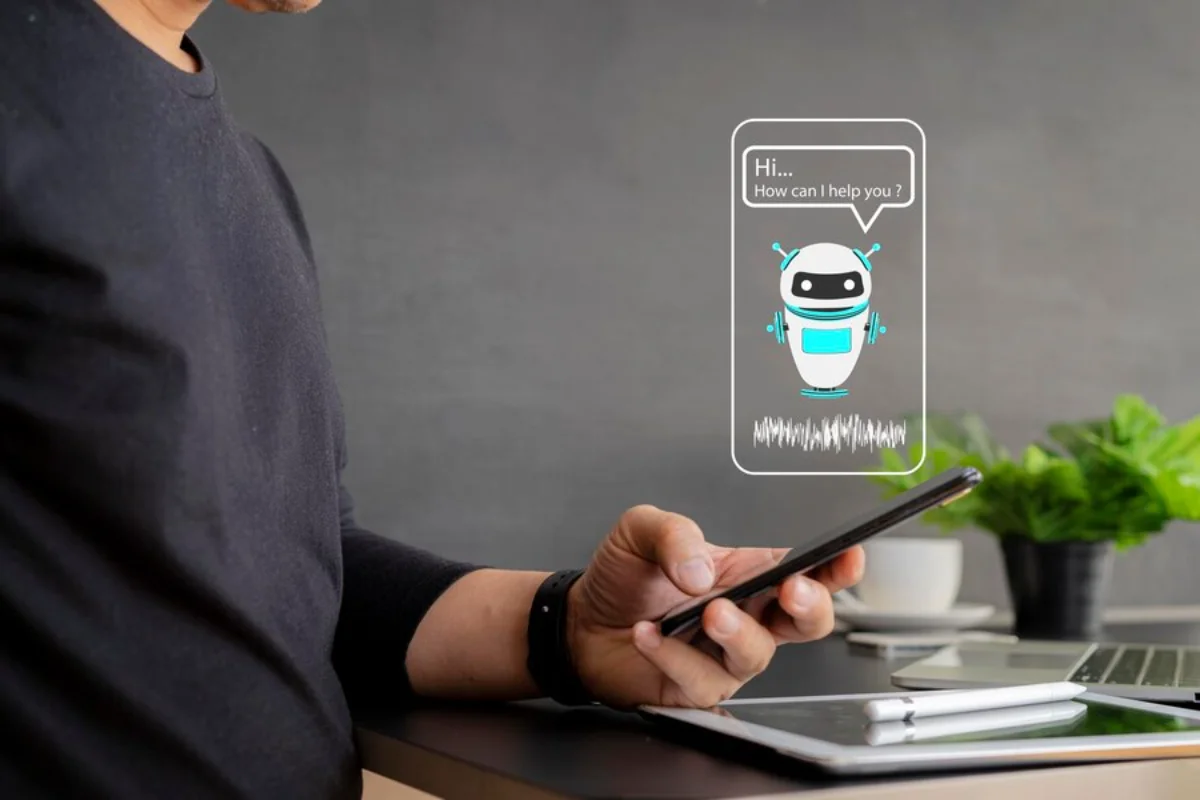
How AI is Transforming Customer Service
The rise of AI in customer service has changed how businesses connect with customers. Thanks to AI automation, companies can offer quick, efficient, and personalised support at scale. From chatbots to predictive analytics, AI improves customer interactions while cutting costs.
Today’s customers want instant responses and tailored solutions. Traditional methods often fall short, leading to delays and unhappy customers. AI-driven tools close this gap by ensuring fast response times and accurate problem-solving, available 24/7.
In this article, we’ll look at how AI reshapes customer service. We’ll focus on chatbots in business, virtual assistants, and AI-driven automation that streamline support. We’ll also discuss the benefits and challenges of adding AI to customer service.

The Rise of AI in Customer Service
AI-Powered Chatbots
A key application of AI in customer service is AI-powered chatbots. These smart assistants can manage many customer queries, from FAQs to transactions. Companies like Amazon, H&M, and British Airways use chatbots in business to deliver quick responses, enhancing customer satisfaction.
These chatbots use natural language processing (NLP) to understand and respond to inquiries in a human-like way. They improve through machine learning algorithms, learning from past interactions to refine their answers. This leads to more accurate and relevant information for customers.
Some advanced chatbots even have sentiment analysis features. This lets them gauge customer emotions and adjust their responses. Such capabilities make interactions more engaging and empathetic, cutting down frustration and boosting the overall experience.
AI Automation for Customer Support
AI automation is vital in customer service. It automates repetitive tasks, like ticket sorting and response generation. This helps human agents focus on complex issues, improving efficiency and ensuring timely resolutions. For example, AI-driven ticketing systems can prioritise urgent requests.
Automated response systems can handle a high volume of inquiries without delays. AI sorts and routes queries to the right department, ensuring customers get help from the best specialists.
By using AI automation in CRM (Customer Relationship Management) platforms, businesses can streamline support processes for smoother interactions.

Benefits of AI in Customer Service
24/7 Availability
Unlike human agents, AI chatbots and virtual assistants work around the clock. They provide 24/7 support, ensuring customers get help anytime. This boosts the overall customer experience. Whether for simple queries or urgent needs, AI keeps customers from waiting.
For global businesses, AI in customer service means support is available across time zones, enhancing accessibility and responsiveness.
Cost Efficiency
Integrating AI automation into customer service helps businesses cut costs related to hiring and training agents. AI systems require minimal upkeep and can manage thousands of inquiries simultaneously. This makes them a cost-effective choice.
AI also minimises costs tied to human error. AI tools give consistent, accurate responses, reducing misunderstandings and ensuring customers get the right information the first time.
Personalization and Data-Driven Insights
AI-driven customer service solutions use machine learning to analyse customer interactions and preferences. This allows businesses to offer personalised responses, product recommendations, and tailored support.
AI can track a customer’s past interactions to provide customised suggestions. This level of personalisation boosts satisfaction and encourages loyalty, driving repeat business.
Additionally, AI analytics tools help businesses spot customer behaviour trends. This insight lets them refine service strategies and offer proactive solutions.

Chatbots in Business: Enhancing Customer Interactions
Handling Common Queries
Chatbots in business excel at managing routine inquiries, such as order tracking and account info. Automating these tasks speeds up responses. It also allows human agents to focus on more complex issues.
AI-powered chatbots can resolve up to 80% of common queries without human help. This significantly eases the customer support workload while delivering instant answers.
AI-Powered Voice Assistants
AI voice assistants, such as Google Assistant and Alexa, are now part of customer service. These assistants handle voice-based queries, creating a more interactive experience.
Voice assistants are great for hands-free interactions, making them ideal for industries like hospitality and healthcare, where quick communication matters.
Multilingual Support
AI chatbots can speak multiple languages, making them essential for global businesses. They ensure smooth communication with customers from diverse backgrounds without needing human translators.
Businesses can boost engagement and satisfaction by breaking down language barriers in different markets.
The Future of AI in Customer Service
Predictive Customer Support
AI-driven predictive analytics can foresee customer issues before they arise. By analysing past interactions and behaviour, AI can suggest solutions proactively, reducing frustration and improving satisfaction.
For example, AI can spot patterns showing a customer might cancel a subscription and intervene with targeted offers or personalised support.
Sentiment Analysis
AI assesses customer sentiment by analysing tone and language in messages. Businesses can use this to customise replies and solve complaints. This boosts engagement strategies.
Sentiment analysis shows how happy customers are right now. This helps businesses make fast changes to meet their needs.
Human-AI Collaboration
Despite AI’s growth, human agents are still vital in customer service. In the future, there will be more teamwork. AI will take care of simple questions, while humans will focus on complex and emotional issues.
AI helps agents by giving real-time tips and summarising customer history. This boosts efficiency.
Challenges of AI in Customer Service
Lack of Human Touch
While AI-powered service is efficient, it lacks human empathy. Some customers prefer speaking with humans, especially on sensitive issues. Businesses must ensure AI complements human support rather than replace it.
Data Privacy Concerns
AI systems gather vast amounts of customer data, raising security and privacy worries. Businesses need strong data protection measures. They must also follow regulations like UK GDPR to keep customer trust.
Implementation Costs
AI can lower operational costs in the long run, but setup and integration can be expensive at first. Businesses should carefully assess the return on investment (ROI) before implementing AI solutions.
The Future of AI-Driven Customer Service
Integrating AI in customer service is changing how businesses connect with customers. It makes support more efficient, cost-effective and personalised. Chatbots help businesses by speeding up responses. AI automation makes service processes faster and more accurate.
As AI technology grows, businesses need to embrace these changes. This helps them stay competitive and improve customer experiences. The future of customer service will mix AI tools with human skills. This will create a balanced and customer-focused support system.


